How Does Honey Make Money – Honey App Exposed!
How Does Honey Make Money – Honey Affiliate Program?
Did you know that PayPal paid a whopping $4 billion to acquire the Honey App? Yes, you heard it right! An app that helps millions of people find discounts and save money online was valued in the billions. But what’s the real secret behind Honey’s massive success, and how do they turn simple coupon codes into a $100 million+ business each year?
In this post, we’ll explain exactly how Honey makes its money, their tactics to rake in profits, and some of the sneaky strategies they employ that you probably didn’t know about.

Honey, the app for coupons…




What is Honey App?
Honey is a widely used browser extension that automatically applies the best discount codes with us online. Honey was started in 2012 to save people time and money while shopping online by eliminating the need to scour the internet for coupon codes. Honey was a useful companion for online shoppers, saving them over $1 billion in savings with more than 17 million monthly active users.
PayPal saw an opportunity to not only enhance its own user experience but also to gain valuable insight into shopping behaviors and trends. In 2020, PayPal acquired Honey for approximately $4 billion, marking one of its largest acquisitions to date. This strategic move aimed to integrate Honey’s savings tools into PayPal’s platform, providing an all-in-one solution that goes beyond checkout, ultimately making shopping easier and more engaging for over 300 million PayPal users
As you can see here from the Honey App installation page.
It says that it’s going to be able to read and change your cookies, which means that they can hijack affiliate cookies from other affiliates.
It says that it will store personal browsing data on your device. This means it will track what you buy, where you buy it, what you click on, and other similar data. It also allows them to see the websites you visit.
But How Does the Honey App Work?
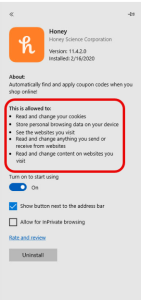
The Honey App primarily collects data related to online shopping to enhance its functionalities, such as applying coupons and providing price tracking. The data collected includes information about:
- The website’s users visit.
- The items they view.
- And any coupons they manually enter.
This data helps Honey improve its algorithms and recommend the best deals, but it does not include sensitive personal details like names, emails, credit card information, or passwords.
However, some reports have indicated that Honey may also log additional browsing information, such as the full URL, timestamps, and device IDs, which could potentially be used to build detailed profiles of user behavior.
When you’re shopping online, Honey pops up at the checkout page and shows if it found any active discounts for the store you’re shopping at. If so, it automatically applies to the one that saves you the most money.
There are a few key features that make Honey stand out:
- Automatic Coupon Application: Once installed on your browser, Honey will search and test available coupon codes in real-time and automatically apply the best one at checkout.
- Droplist: This feature tracks price changes on items you’re interested in and notifies you if the price drops within 120 days.
- Honey Gold Rewards: Earn cashback (Honey Gold points) on purchases at over 5,000 partner stores, which can be redeemed for gift cards.
- Amazon Price Comparison: Honey also compares prices between different sellers on Amazon, including shipping costs and Prime status, and provides price history insights.
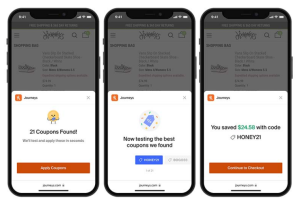
Amazon reviews on the Honey Coupon App


Amazon apparently does not like the honey app, probably because they’re hijacking a lot of commission.
If you’ve installed the app, they can change the cookies and route the commissions to their account.
As it says here, the security warning is that Honey’s browser extension is a security risk.
He tracks your private shopping behavior, collects data like your order history and saved items, and can read or change any data on any websites you visit. To keep your data private and insecure, uninstall this extension immediately.
I think that’s a bit over the top, but this app has some concerns.
Before we go any further, I’ve made millions of dollars promoting and creating my various browser extensions and toolbars.
Most of these browser extensions make money through search.
They have a little search box that defaults to a search engine that they get credit for every time you click on ads.
Very basic, very simple, multi-billion dollar industry.
And how does Honey App help save money on Amazon?
Providing several tools to help users find better deals and track prices over time. Here’s how it works:
Amazon Price Comparison: Honey compares the prices of items across different Amazon sellers, including factoring in shipping costs and Prime status to show you the lowest available price for the exact same product.
Price History: Honey tracks the price history of items over 30, 60, 90, or 120 days, allowing you to see how the cost has fluctuated
Droplist: If you’re not ready to buy an item, you can add it to your Droplist, and Honey will alert you when the price drops below a set threshold.

The Coupon Website Business Model: How It’s All Connected
Before apps like Honey, there were traditional coupon websites. These sites earned revenue by ranking in Google for search terms like “Best Buy coupons” or “Target discount codes.” Visitors would click on the coupon link, and the site would earn a commission if a purchase was made.
Honey takes this concept a step further. Instead of waiting for users to visit a website, Honey is embedded directly in the browser, meaning it can act in real-time to influence purchasing decisions. This makes it even more powerful because it doesn’t rely on users visiting a particular site—instead, it follows them wherever they shop.

Rakuten and Capital One Shopping vs Hone App
Honey isn’t the only player in this space. Apps like Rakuten (formerly Ebates) and Capital One Shopping operate similarly by offering cashback and tracking purchases through affiliate links.
Rakuten, for example, was originally an affiliate network known as LinkShare before rebranding. Now, it positions itself as a cashback app, giving users a percentage of the commission it earns for referring them to stores.
The key takeaway? These apps and extensions are all about owning a share of your online shopping behavior. Whoever controls that space can influence where you shop, what you buy, and how much money you make.
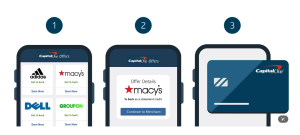
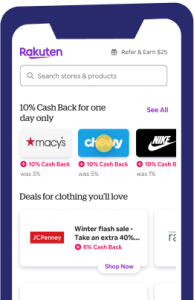
Is Honey Safe to Use?
From a privacy standpoint, using Honey is a trade-off. Yes, it can save you money on purchases, but in exchange, you’re giving up control over your browsing data and allowing an extension to monitor and potentially manipulate your shopping experience.
Honey can be a valuable tool if you’re comfortable with that trade. But if you’re concerned about privacy, consider other ways to find deals online, such as visiting coupon websites manually or using browser settings that limit data tracking.
Impact on Affiliate Marketing
Honey’s business model involves forming partnerships with various retailers. The extension earns commissions on sales through its platform by directing users to partner retailers. This commission-based model can create conflicts of interest.
Potential Conflict of Interest:
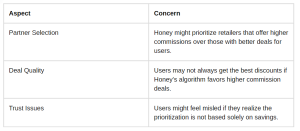
Understanding how Honey works and makes its money is crucial for anyone who uses coupon extensions or is involved in digital marketing. While Honey does help users save money, it’s also a highly sophisticated data-tracking tool that earns its profits through a mix of affiliate commissions and behavioral tracking.






One Response to How Does Honey Make Money – Honey App Exposed!